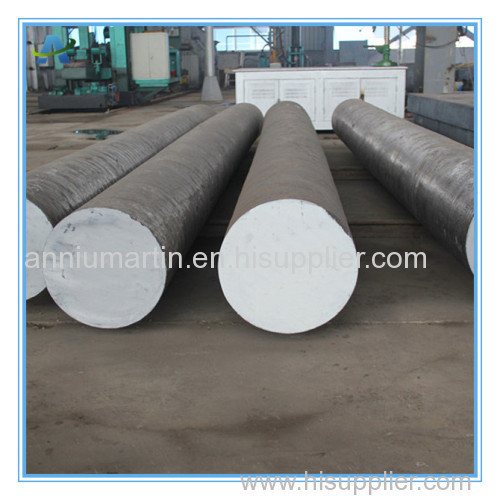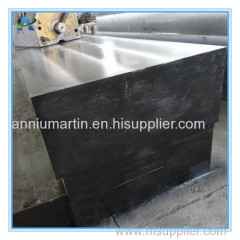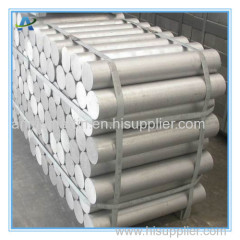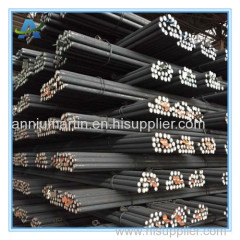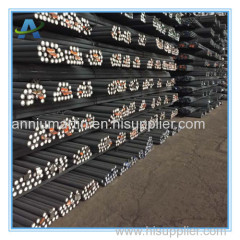
|
Shandong Anniu Group
|
42CrMo4 Alloy Structural Steel
| Price: | 500.0~900.0 USD |
| Payment Terms: | T/T,L/C |
| Place of Origin: | Shandong, China (Mainland) |
|
|
|
| Add to My Favorites | |
| HiSupplier Escrow |
Product Detail
Description:
42CrMo4 materials have been widely used in automotive driving elements. Although 42CrMo4 is more expensive than 41Cr4, it is more prefer
Description:
42CrMo4 materials have been widely used in automotive driving elements. Although 42CrMo4 is more expensive than 41Cr4, it is more preferable in terms of material properties. In this study, these two materials were heat treated by austenitizing in a continuous furnace at 850 °C and quenched in oil at 90 °C. After they were tempered at various temperatures, mechanical properties were determined for each tempering temperature. The material properties for both materials were compared with each other. Results indicated that same mechanical properties for 41Cr4 and 42CrMo4 can be achieved by tempering 41Cr4 about 50 °C lower temperature than for 42CrMo4. In addition to the mechanical tests, fatigue tests were performed for both materials. Weibull distributions were plotted. Results indicated that 42CrMo4 had a longer life than 41Cr4 material.
Chemical Composition
Properties | Metric | Imperial |
Hardness, Brinell (typical) | 300 | 33 |
Hardness, Rockwell C (typical) | 30 | 30 |
Tensile strength, ultimate | 965-1030 MPa | 140000-150000 psi |
Yield strength, | 827-862 MPa | 120000-125000 psi |
Elongation at break (in 50 mm (2")) | 20.0% | 20.0% |
Compressive strength | 862 MPa | 125000 psi |
Charpy impact (V-Notch) | 27.1-33.9 J | 20.0-25.0 ft-lb |
Poisson's ratio | 0.27-0.30 | 0.27-0.30 |
Elastic modulus | 190-210 GPa | 27557-30457 ksi |
Hot forming | Narmalaizing+N | Quenching+Q | Quenching+Q | Tempering+T | Stress-relieving+SR | |
1100-850C | 870 C air | 860 C oil or polymer | 850 C water | 540-680 C | 50°C under the temperature | |
Soft annealing+A | Isothermal annealing+i | Spheroidizing annealing+AC | End Quench hardenability test | Pre heating welding | Stress-relieving after welding | |
720 C air(HP max 241) | 820 C fumace cooling to 670 C, then air (HB max 200) | 840 C water | 300 C | 550 C fumace cooling | ||
Ac1 | Ac3 | Ms | Mf | |||
745 C | 790 C | 335 C | 120 C |
Mechanical Properties((Hardened and Tempered):
Dia Scope(mm) | Tensile Strength Rm (Mpa) | Yield Strength R2 (Mpa) | Elongation (longitudinal direction) Al (%) | Reduction of area (%) | Impact Energy Joules (-20°C) |
16 max | 1100-1300 | 900 min | 10 min | 40 min | 30 min |
16-40 | 1000-1200 | 750 min | 11 min | 45 min | 35 min |
40-100 | 900-1100 | 650 min | 12 min | 50 min | 35 min |
100-160 | 800-950 | 650 min | 13 min | 50 min | 35 min |
160-250 | 750-900 | 500 min | 14 min | 55 min | 35 min |
Heat Treatment:
· Forging: Heat to 1150°C Hold until uniform.Minimum forging temperature 850°C. Cool slowly in ashes or sand etc.
· Annealing: Heat to 830°C – 850°C. Cool in furnace.
· Normalising: Heat to 870°C – 900°C. Cool in still air.
Forging
Heat to 1150 °C Hold until uniform. Minimum forging temperature 850°C. Cool slowly in ashes or sand etc.
ANNEALING
Heat to 830°C – 850°C. Cool in furnace.
Normalizing
Heat to 870°C – 900°C. Cool in still air.
Stress Relieving:
• Annealed: Heat to 600°C – 650°C
• Hardened: Heat to 500°C – 550°C. Cool in still air
• Hardening:Heat to 830°C – 880°C. Quench in oil or polymer.
• Tempering:Heat to 450°C – 700°C cool in still air.
NB. Tempering within the range 200°C–420°C will result in temper brittleness and should be avoided Flame and Induction Hardening: Heat quickly to the required case depth at 860°C – 890°C and quench immediately in water or oil. Tempering at 150°C – 200°C will reduce stresses in the case with minimal effect on its hardness. All de-carburised surface material must first be removed to ensure best results.
• Nitriding: Heat to 500°C – 530°C and hold for sufficient time to develop the depth of case required Parts should be pre-hardened and tempered as required and also premachined leaving a small grinding allowance only.

